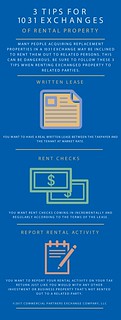Investing in real estate can be a lucrative endeavor, but it often comes with hefty tax burdens. However, savvy investors have found a way to defer these taxes and maximize their gains through a 1031 exchange.
While this strategy is commonly used within the United States, did you know that it can also be applied internationally? In this article, we will explore the potential of a 1031 exchange in Mexico, providing you with valuable insights into how you can leverage this investment opportunity.
Introduction to 1031 Exchanges
A 1031 exchange is a tax-deferral strategy that allows investors to postpone capital gains taxes when selling an investment property. By reinvesting the proceeds into another like-kind property, investors can defer tax payments and continue growing their wealth through real estate investments.
This powerful tool has been widely utilized in the United States for many years, offering investors the opportunity to diversify their portfolios and build long-term financial success.
International 1031 Exchange Rules and Regulations
International 1031 exchanges bring unique challenges due to differences in legal systems, tax codes, and cultural norms across countries. Each country has its own rules governing these transactions, varying significantly from those in the United States.
Navigating these complexities requires a thorough understanding of both the home and destination country’s regulations. Engaging professionals experienced in international tax law can help ensure compliance and maximize benefits.
Successfully completing an international 1031 exchange demands attention to detail, knowledge of legal systems, and adherence to specific guidelines in each country involved.
Understanding the Process of a 1031 Exchange
A 1031 exchange allows real estate investors to defer taxes on their investment gains. It involves selling an investment property (relinquished property) and using the proceeds to acquire another like-kind property (replacement property) within a specific timeframe.
Investors must adhere to strict timelines and guidelines set by tax authorities to qualify for tax deferral benefits. This process can also be applied to foreign properties, but additional considerations arise due to international tax laws.
Utilizing a 1031 exchange when acquiring two overseas properties simultaneously allows investors to diversify their holdings while deferring taxes on capital gains from both properties. Overall, careful planning, research, and expert guidance are crucial for maximizing the benefits of a 1031 exchange.
Exploring the Potential of a 1031 Exchange in Mexico
Mexico’s real estate market is a prime choice for international investors considering a 1031 exchange. With consistent growth and stability, Mexico offers opportunities for portfolio expansion. Popular destinations like Cancun, Playa del Carmen, and Puerto Vallarta provide promising prospects for appreciation and rental income.
However, before proceeding with a 1031 exchange in Mexico, it’s crucial to understand the country’s tax laws and regulations. Consulting local experts specializing in international tax matters ensures compliance and maximizes investment benefits.
Explore the potential of a 1031 exchange in Mexico to diversify your portfolio and capitalize on the country’s thriving real estate market.
Requirements and Considerations for a 1031 Exchange in Mexico
To participate in a 1031 exchange involving Mexican properties, certain eligibility criteria must be met. This includes adhering to the like-kind property requirement and complying with residency or citizenship regulations as per Mexican law. Additionally, individuals must consider any additional requirements specified by the tax authorities.
Expert guidance is crucial to navigate the complexities of the exchange process and ensure compliance. By meeting these requirements and seeking professional assistance, individuals can successfully carry out a 1031 exchange in Mexico.
Risks and Challenges Associated with International 1031 Exchanges
International 1031 exchanges come with a set of risks and challenges that must be addressed. These include currency fluctuations, cultural differences and language barriers, as well as local legal procedures and bureaucracy.
Currency fluctuations can impact investment value and returns. Mitigating this risk involves implementing strategies like hedging or diversifying currency exposure.
Cultural differences and language barriers can complicate communication during the exchange process. Working with local professionals well-versed in both US and Mexican real estate markets helps bridge these gaps.
Navigating local legal procedures and bureaucracy is another challenge. Understanding Mexico’s legal system and partnering with experienced local attorneys is crucial to address any potential obstacles smoothly.
To ensure a successful international 1031 exchange, careful planning, attention to detail, and collaboration with knowledgeable professionals are key.
| Risks & Challenges |
|---|
| Currency Fluctuations |
| Cultural Differences & Language Barriers |
| Local Legal Procedures & Bureaucracy |
Tips for Navigating an International 1031 Exchange
Navigating an international 1031 exchange requires careful planning and expertise in international tax laws. Here are some tips to help you succeed:
- Seek professional advice from experts familiar with international tax laws to ensure compliance with both U.S. and Mexican regulations.
- Establish relationships with local real estate agents and attorneys who can provide guidance on property selection, legal matters, and cultural nuances.
- Stay updated on economic trends, political stability, and regulatory changes in Mexico to make informed investment decisions.
By following these tips, you can navigate an international 1031 exchange successfully and maximize your investment benefits while minimizing risks.
VIII: Case Studies of Successful or Noteworthy International 1031 Exchanges
Navigating international 1031 exchanges can be complex, but real-life case studies offer valuable insights. One case study involves a multinational company expanding into Europe, successfully acquiring properties in Germany while deferring taxes on their U.S. assets.
Another case study features an investor diversifying their portfolio with a luxury villa in Thailand, overcoming challenges through local expertise. These examples highlight the importance of planning, research, and expert guidance for successful international exchanges.
Key Takeaways from Case Studies:
- Engaging tax advisors and real estate professionals with international expertise is crucial for navigating complex regulations.
- Overcoming challenges like language barriers and unfamiliar regulations may require collaboration with local agents.
- Thorough research and expert guidance are essential for preserving investment value through tax-deferred transactions.
In summary, case studies of successful international 1031 exchanges shed light on strategies employed by investors to overcome hurdles and achieve success.
[lyte id=’HxWR5yckClk’]







